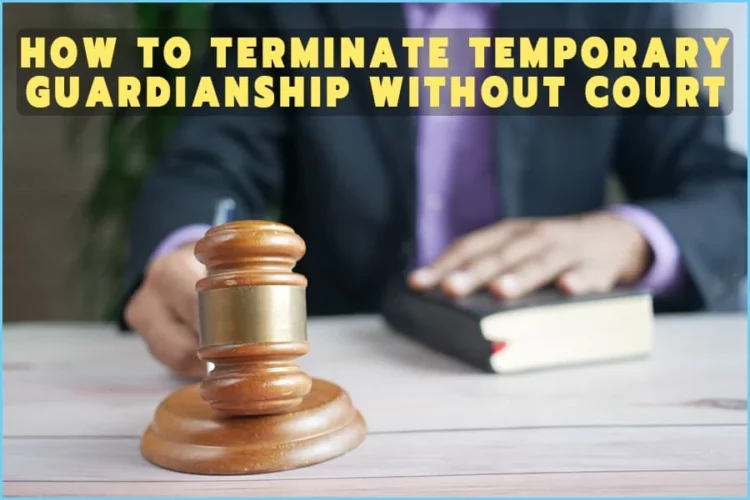There are many situations where parents are unable or not fit to care for a child properly. In such cases, the child gets custodial parents.
Such agreements are either temporary or permanent. In temporary agreements, the child’s custodial parents can end the guardianship. It happens if the parent or parents prove that they can care for the child.
There are several court processes a custodial parent can take to end guardianship. Before we look at these processes, let us find out:
How To Terminate Temporary Guardianship Without Court
It is possible to end temporary guardianship without going through the courts. There are, however, situations where it is necessary to go through the courts.
If guardianship results from legal cases, you must settle such agreements in the courts. Legal proceedings, in this case, refer to investigations, e.g., where a court finds that a child got neglected.
In such cases, if you are seeking to terminate the guardianship agreement, there are conditions. The parent has to prove that they are competent enough to care for their child.
There are cases where temporary agreements don’t arise from court decisions. In such cases, parties sign a legal document called a stipulation.
What is a stipulation? A stipulation is a document confirming that an existing temporary custodial agreement is no longer in place.
The custodial parents and the actual parents sign the agreement. There are special cases where the child can sign the agreement. It happens if they are over 14 years old.
The document states the future custodial plans. It states the reasons why the guardianship ended.
Once the parties have agreed to end the agreement, the document needs to get notarized. The notary goes over the signature to ensure that there not forged.
Instead of hearing, the parties present the notarized stipulation before a judge. The judge reviews the agreement and grants its approval.
The new parenting plans start as soon as the judge grants their approval. Settling custodial agreements outside courts is a faster way of ending custodial agreements.
Terminating Guardianship Through The Courts
You can choose to end guardianship through legal court. The process is often long and involves many steps. Some states have fewer processes than others.
The person awarded temporary guardianship goes before a judge. The guardian’s responsibility is to prove to the judge that the existing legal agreement is no longer necessary.
Before the court agrees to the guardianship transfer, it considers several things.
The court will determine the child’s best interests in the custodial exchange process. The court can use several methods to determine whether the exchange is good for the child.
The court looks at the relationship between the child and their parents. A court will not transfer guardianship if it deems the relationship abusive.
A judge will assess a parent’s ability to provide a stable and loving relationship. The parents should be able to provide for the child’s health needs. It includes provisions for physical and emotional needs.
If the child is old enough, a court might allow them to express their wishes about a custodial plan. Courts are unlikely to agree to termination if the parent has a drug abuse problem.
If the court is satisfied that the child’s parents are capable, it will agree to the custody transfer. If the court is not satisfied, the original guardianship remains. It is, therefore, up to the guardians to prove the parent’s capabilities.
The court needs to check and notarize the transfer. If you decide to terminate the agreement in or out of court, a judge still needs to check for proper documentation.
How Can You Stop Being A Guardian?
It is possible to cease to become a child’s legal guardian. It may happen through natural causes or revocation of guardianship rights.
Death is one of the obvious ways to stop being a legal guardian. The death of a guardian automatically ends any existing guardianship agreement. The court shall determine the person best suited to take care of the child.
A judge will use their best judgment to assign custody.
If a child attains the age of majority, any custody agreement becomes voidable. The guardian might continue caring for the adult out of their goodwill. There is no legal responsibility for a guardian to keep caring for the adult.
The age of the majority suggests that the adult is responsible for themselves.
You can stop being a guardian if the court allows a transfer of guardianship. The court determines the parent’s competence.
The court then decides whether the parent is fit and transfers custody. You can choose to go through a notary following a mutual agreement with the parent to terminate the guardianship.
There are some laws for moving out of a state. The state courts determine guardianship and custodial matters. If you transfer out of a court’s sway, you must apply for guardianship in the new state.
The process could be different if federal courts determined guardianship; however, it is not the case.
If you become incompetent in childcare, a court will end your guardianship. It might be through becoming mentally unwell. The court reassigns guardianship in these cases.
A court can change guardianship in cases of abuse and negligence. Any evidence suggesting that you cannot meet a child’s best interest ends a custody agreement.
Why The Courts Assign Temporary Guardianship
There are several reasons for a court to assign temporary guardianship. The court looks out for children’s best interests.
A court may assign guardianship if the parent has not attained the age of majority. In cases where the parents are too young, courts cannot trust them to care for the children. It is, therefore, reasonable for someone else to take up parental duties.
Parents should ensure that they steer clear of substance abuse. Courts might assign temporary guardianship to someone else if the parents have an addiction impairing their abilities. The court will restore custody if the parents get treated and recover from drug abuse.
Mental illness may impair someone’s ability to provide reasonable child care. In such cases, courts give guardianship to someone else. The parent would have to undergo treatment and recover from the illness. Upon recovery, the parents will get custody back.
There are cases where a child needs to find emergency guardianship. It can be in situations like the sudden death of a parent.
A judge might give temporary guardianship to meet the child’s immediate needs. The judge might review guardianship afterward.
One of the biggest reasons for guardianship is child abuse. A parent can no longer have custodial rights if they harm their child.
It is, therefore, a credible reason to revoke parental rights. The rights get revoked, and a court assigns temporary guardianship.
If a parent is neglectful, the courts take away their children and assign temporary guardianship. Some cases require parents to take classes and learn how to care for their kids.
Responsibilities Of A Temporary Guardian
A temporary guardian has several responsibilities. They include:
Providing Care
A guardian should provide the same level of care that a parent provides.
They are responsible for the overall well-being of the child. Guardians should provide for the medical care of children in their custody.
A guardian provides dental healthcare. They ensure that the children get an education.
Availing Basic Needs
A guardian must ensure that the child in their care has access to basic needs. They should have food, a roof over their heads, and clothing. These are the fundamental requirements for basic living.
Not providing necessities is considered neglect. A court takes guardianship away from a neglectful parent.
Protecting the Child
A guardian should protect the child and ensure that they are safe. Safety goes beyond security. They must provide a safe environment suitable for the child’s growth and development. Failing to protect the child is neglect.
Deciding Housing arrangements
A guardian not only provides shelter but decides where the child lives. They have the authority to decide the best living area or location for the child. The environment must never be abusive or unhealthy for the child.
Court Reports
Some states require guardians to fine court reports at least once annually. A court can appoint a social worker to meet and assess the child’s wellbeing.
Conclusion
Knowing how to terminate temporary guardianship without court, can make things much easier. You do not have to go through the court system to end a temporary guardianship agreement.
You can decide to go the court route if you wish to make things more formal or official.
There are several scenarios in which parents cannot care for their children adequately. In such circumstances, the kid gets placed with custodial parents.
These agreements might be temporary or permanent. The child’s custodial parents will relinquish guardianship under temporary arrangements. It occurs when the parent or parents display their ability to care for the child.










